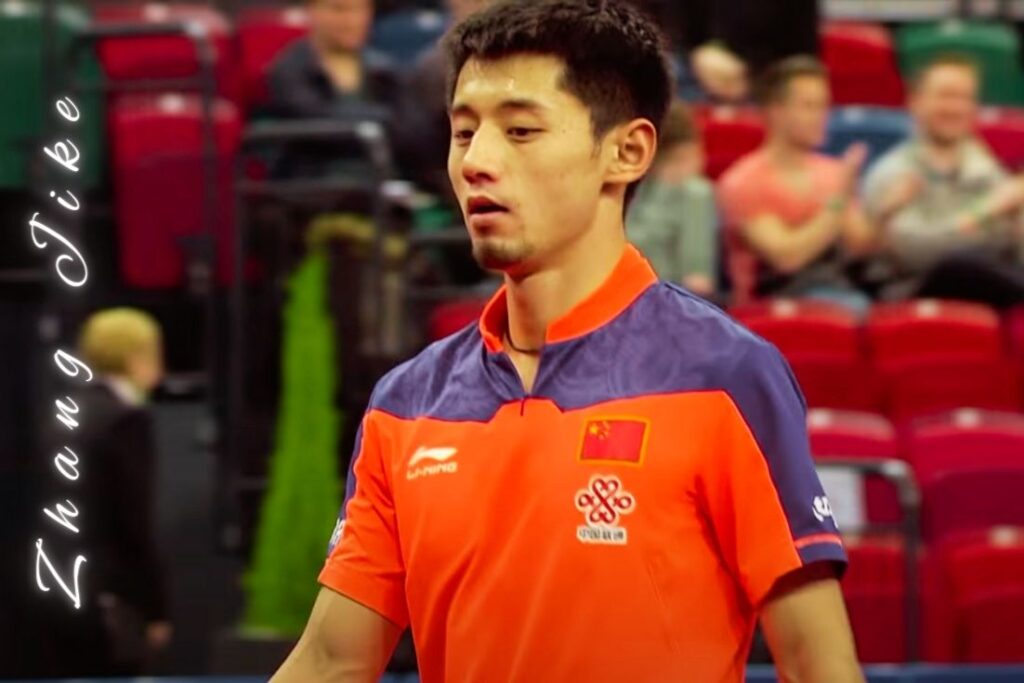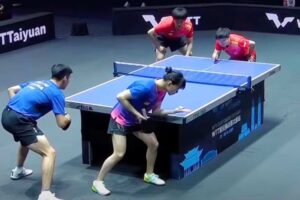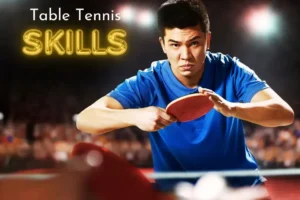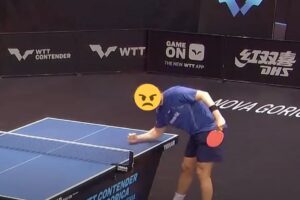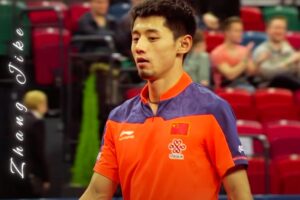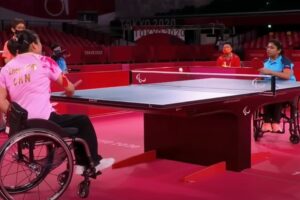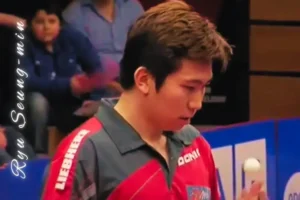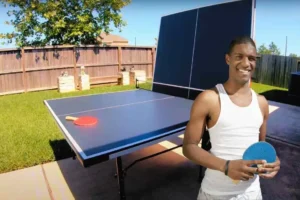In the realm of table tennis, few names evoke as much reverence and admiration as Zhang Jike. His career, punctuated by extraordinary talent, relentless determination, and a series of historic triumphs, epitomizes the pinnacle of what one can achieve through sheer passion and hard work. Zhang Jike’s journey from a young boy with a dream to a celebrated world champion is not only inspiring but also deeply moving.
This blog delves into the life and legacy of Zhang Jike, capturing the essence of his incredible journey and the indelible impact he has made on the sport of table tennis.
Profile of Zhang Jike
Zhang Jike was born on February 16, 1988, in the coastal city of Qingdao, Shandong province, China. His name, inspired by the legendary Brazilian footballer Zico, signifies the profound influence of sports within his family. Zhang’s father, Zhang Chuanming, was a former professional table tennis player and coach, whose passion for the sport had a lasting impact on his son.
From a tender age, Zhang Jike displayed an extraordinary affinity for table tennis. At the age of five, he began playing under the meticulous guidance of his father. By six, he was deeply immersed in rigorous training sessions that honed his natural talent and fostered a fierce competitive spirit. His early years were marked by a relentless pursuit of excellence, a trait that would define his professional journey.
Zhang’s rapid rise in the sport saw him join the Chinese national team in 2006. His entry into professional table tennis was characterized by a meteoric ascent through the ranks. Zhang Jike’s blend of raw talent, intense training, and strategic gameplay quickly set him apart as a future champion. His ability to adapt and innovate on the table earned him recognition and respect from peers and fans alike.
See More: Wang Liqin: The Legendary Dominance in Table Tennis
Major Wins and Tournaments
Zhang Jike’s career is adorned with numerous victories and accolades, reflecting his dominance in the sport. Below is a detailed table highlighting some of his most significant wins and achievements:
| Year | Tournament | Result | Details |
|---|---|---|---|
| 2011 | World Table Tennis Championships | Gold (Singles) | Defeated Wang Hao in the final, securing his first world title. |
| 2011 | Table Tennis World Cup | Gold (Singles) | Triumphed over Joo Se Hyuk, showcasing his superior technique. |
| 2012 | Summer Olympics | Gold (Singles) | Emerged victorious against Wang Hao, celebrated with iconic shirt rip. |
| 2012 | World Table Tennis Championships | Gold (Team) | Contributed to China’s dominant performance in team events. |
| 2013 | World Table Tennis Championships | Gold (Singles) | Defeated Wang Hao once again, solidifying his top position. |
| 2014 | Table Tennis World Cup | Gold (Singles) | Continued his winning streak with a decisive victory. |
| 2016 | Summer Olympics | Silver (Singles) | Fought valiantly but lost to Ma Long in a highly anticipated match. |
| 2016 | World Table Tennis Championships | Gold (Team) | Helped secure another team championship for China. |
These victories underscore Zhang Jike’s dominance in the sport and his ability to perform under pressure, securing his legacy as one of table tennis’s greatest players.
Playing Style and Techniques
Zhang Jike’s playing style is characterized by its aggressiveness, precision, and strategic ingenuity. He is renowned for his powerful forehand loops and backhand drives, executed with remarkable speed and spin. His exceptional footwork allows him to maintain strong positioning during rallies and respond swiftly to his opponent’s shots.
One of Zhang’s signature techniques is his backhand flick, a move that has often left his opponents scrambling. His ability to switch seamlessly between offense and defense, coupled with his strategic placement of shots, makes him a formidable opponent. Zhang Jike’s mental toughness and focus during matches are equally notable, often giving him the edge in high-stakes games.
Zhang’s forehand is a weapon that combines power and precision. His ability to generate topspin with his forehand loop is one of the key elements of his success. He uses this shot not only to dominate rallies but also to force errors from his opponents. His backhand, equally lethal, is versatile and can switch from a defensive block to an aggressive drive within the same point.
Zhang Jike’s serve is another crucial component of his game. Known for his deceptive serves, he uses variations in spin and speed to unsettle opponents right from the start of the point. His serves often set up his powerful third-ball attacks, putting him in control of the rally from the outset.
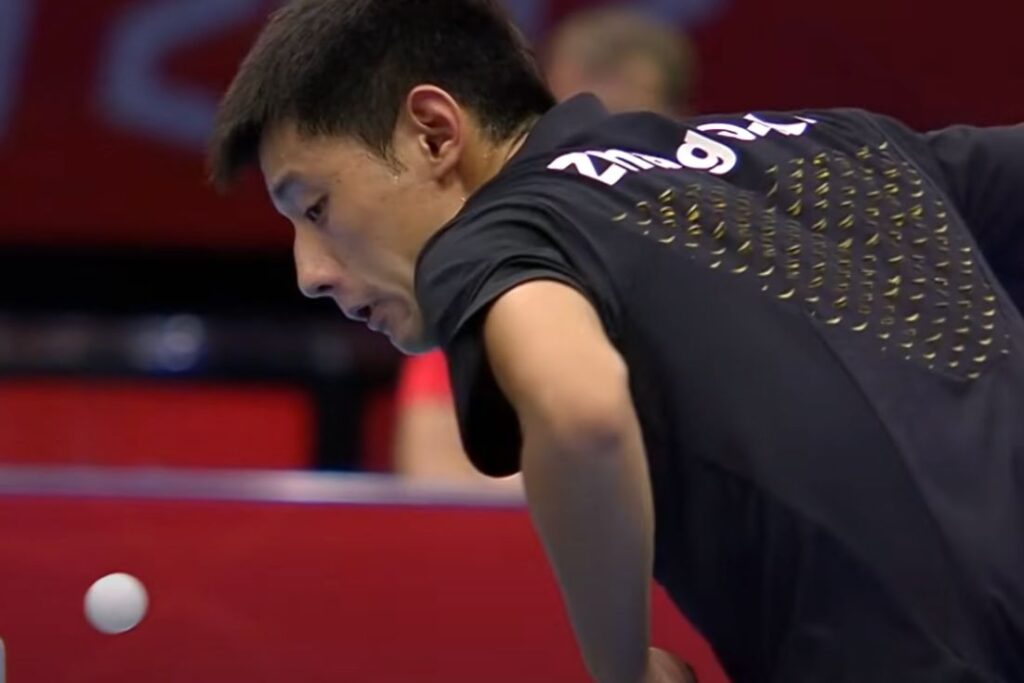
Historical Impact
Zhang Jike’s impact on table tennis extends beyond his impressive list of titles. He played a crucial role in popularizing the sport globally, particularly through his charismatic personality and dramatic playing style. Zhang’s victories in major international tournaments helped elevate the profile of table tennis, drawing in new fans and inspiring young players around the world.
Moreover, Zhang Jike’s achievements have had a significant impact on the Chinese national team’s dominance in the sport. His success has set a benchmark for future generations, contributing to the ongoing development of table tennis in China. Zhang’s influence is evident in the way the sport is perceived and played, both in his home country and internationally.
Zhang Jike’s emotional and often exuberant celebrations have made him a fan favorite. His iconic shirt-ripping celebration after winning the 2012 Olympic gold is etched in the memories of sports enthusiasts worldwide. These moments have not only endeared him to fans but also brought a human element to the sport, showing the intense passion and dedication that top players bring to the table.
Training Regimens
Zhang Jike’s training regimen is as intense as it is meticulous. His daily routine typically includes several hours of practice focused on honing his technique, improving his footwork, and enhancing his physical fitness. Zhang’s training sessions are designed to simulate match conditions, allowing him to develop the stamina and mental resilience needed for competitive play.
In addition to technical drills, Zhang places a strong emphasis on strength and conditioning. His workouts include weight training, cardiovascular exercises, and flexibility routines, all aimed at ensuring peak physical performance. Mental training is also a key component of Zhang’s regimen, with techniques such as visualization and meditation used to maintain focus and composure under pressure.
Zhang’s practice sessions are known for their intensity and structure. He often engages in multi-ball training, where a coach feeds him balls in rapid succession to improve his reflexes and shot consistency. This type of training helps him develop quick decision-making skills and enhances his ability to handle high-pressure situations during matches.
Another key aspect of Zhang’s training is his focus on strategy and game analysis. He spends considerable time studying his opponents, and analyzing their strengths and weaknesses to develop effective game plans. This strategic approach has been a significant factor in his success, allowing him to anticipate his opponent’s moves and counter them effectively.
Personal Anecdotes and Stories
Throughout his career, Zhang Jike has been involved in numerous memorable incidents and anecdotes that highlight his character and determination. One such story is from the 2012 London Olympics, where Zhang famously tore off his shirt in celebration after winning the gold medal in the men’s singles event. This act of jubilation not only showcased his passion for the sport but also became an iconic moment in Olympic history.
Another notable anecdote involves Zhang’s resilience and ability to bounce back from setbacks. In 2015, he suffered a significant slump in form, leading many to question whether he could return to his previous heights. However, Zhang’s unwavering determination saw him make a remarkable comeback, culminating in his performance at the 2016 Rio Olympics, where he won a silver medal in singles and a gold in the team event.
Zhang Jike’s journey is also marked by his interactions with fans and his contributions off the table. He is known for his approachable nature and willingness to engage with fans, often signing autographs and taking photos. His popularity transcends the sport, making him a beloved figure not just in China but around the world.
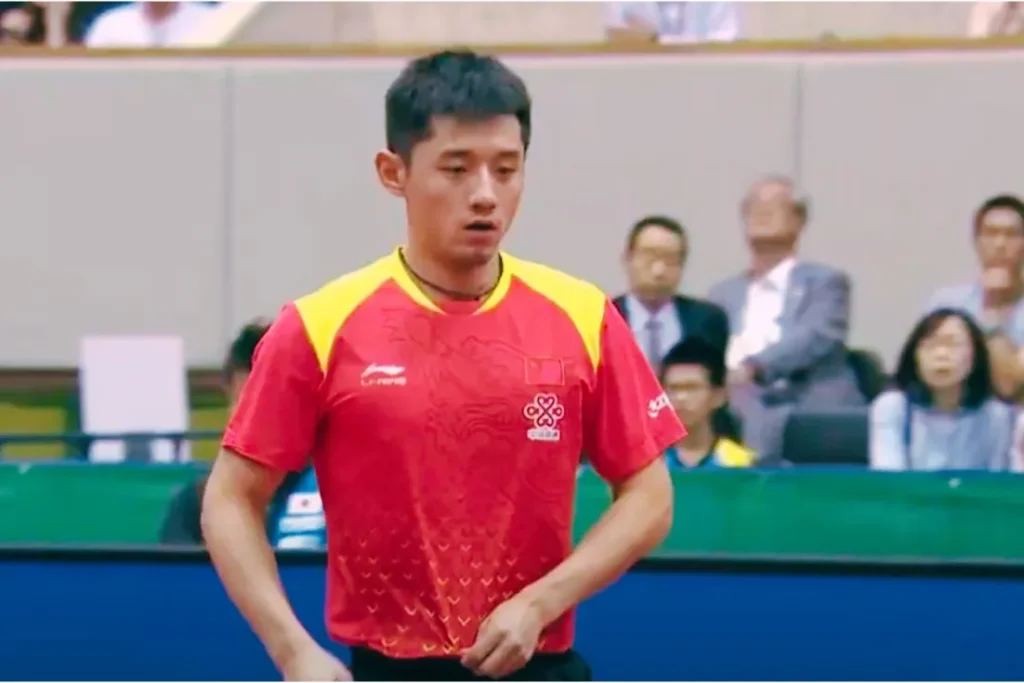
Interviews and Quotes
Zhang Jike’s interviews often provide insight into his mindset and approach to the sport. In one interview, he stated, “Table tennis is not just a game to me; it’s a way of life. Every match, every practice session is an opportunity to push my limits and redefine what I can achieve.”
Another memorable quote from Zhang reflects his philosophy on handling pressure: “In those crucial moments, it’s not about the opponent or the score. It’s about staying calm, trusting your training, and playing with heart.”
These quotes encapsulate Zhang’s dedication to table tennis and his belief in the importance of mental strength. His words often inspire young athletes to pursue their dreams with the same passion and commitment.
In various interviews, Zhang has also spoken about the importance of teamwork and camaraderie within the Chinese national team. He credits much of his success to the support and guidance of his coaches and teammates, highlighting the collaborative effort that goes into achieving excellence in table tennis.
Comparative Analyses
Comparing Zhang Jike to other legendary players offers a fascinating perspective on his place in the history of table tennis. When matched against contemporaries like Ma Long or historical greats like Jan-Ove Waldner, Zhang’s aggressive style and tactical brilliance stand out. While Ma Long is often praised for his consistency and technical perfection, Zhang’s flair and explosive play have earned him a unique spot among the sport’s elite.
Analyzing their head-to-head matches reveals the depth of their rivalry and the high level of competition in modern table tennis. Zhang’s victories over top-ranked players, combined with his ability to perform in clutch situations, underscore his prowess and competitive spirit.
In particular, Zhang Jike’s head-to-head battles with Ma Long have been some of the most thrilling encounters in modern table tennis. These matches are not just about skill but also about mental fortitude and strategic acumen. Zhang’s ability to challenge and often overcome Ma Long in crucial matches highlights his exceptional capabilities and his place among the very best in the sport.
Evolution of the Game
Zhang Jike’s career has coincided with significant changes in table tennis, from advancements in equipment to shifts in playing styles. His adaptation to these changes has been a testament to his versatility and commitment to staying at the forefront of the sport.
The introduction of new materials for paddles and changes in ball size and composition have influenced the dynamics of the game. Zhang’s ability to innovate and refine his techniques in response to these changes has kept him competitive at the highest levels. His contributions to the sport have also included inspiring new training methods and strategies that continue to shape the future of table tennis.
One of the major changes in the sport has been the switch from celluloid to plastic balls. This change affected the speed and spin of the game, requiring players to adjust their techniques and strategies. Zhang Jike’s seamless transition and continued success with the new ball demonstrate his adaptability and deep understanding of the game.
Zhang has also been part of the era that saw an increased emphasis on athleticism and fitness in table tennis. His rigorous training routines and focus on physical conditioning reflect this shift, showing how modern players need to be well-rounded athletes to compete at the highest level.
Fun Facts and Trivia
- Zhang Jike is named after the Brazilian footballer Zico, reflecting his father’s passion for sports.
- He is one of only a few players to complete a career Grand Slam, winning the World Championships, World Cup, and Olympic gold.
- Zhang is known for his distinctive celebration style, which often includes dramatic gestures and displays of emotion.
- He has a significant following on social media, where he shares insights into his training, matches, and personal life.
- Zhang Jike once made headlines for his participation in a popular Chinese reality TV show, showcasing his versatility and appeal beyond the table tennis community.
- Despite his intense competitive nature, Zhang is known for his humility and sportsmanship, often praising his opponents and acknowledging their strengths.
Conclusion
Zhang Jike’s journey from a young boy in Qingdao to a global table tennis icon is a story of talent, hard work, and indomitable spirit. His achievements on the table are matched by his contributions to the sport’s popularity and evolution. Zhang’s legacy as one of the greatest table tennis players of all time is firmly established, and his influence will continue to inspire future generations.
As we reflect on Zhang Jike’s career, we are reminded of the power of dedication and the impact of pursuing one’s passion with unwavering resolve. Zhang Jike is not just a champion; he is a symbol of what can be achieved through hard work, resilience, and a love for the game. His story is a testament to the heights one can reach with determination and the unyielding pursuit of excellence.
